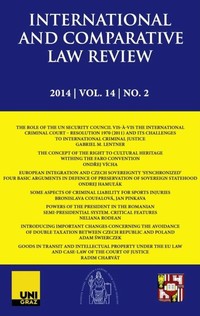Post-Brexit. The Politics of Resentment and EU Reintegration: Creating A New Legal Constitution for Capitalism
Post-Brexit. The Politics of Resentment and EU Reintegration: Creating A New Legal Constitution for Capitalism
Author(s): K.A.C. O’RourkeSubject(s): International Law, International relations/trade, Economic development, Present Times (2010 - today), EU-Approach / EU-Accession / EU-Development, Globalization, EU-Legislation
Published by: Univerzita Palackého v Olomouci_1
Keywords: Sovereignty; BREXIT; GeoNOMOS Model; Economic Globalization; Piketty; Politics of Resentment; European Union; Framework of Liberty; Legal Constitution for Capitalism;
Summary/Abstract: The GeoNOMOS model introduced in Part I, is a qualitative descriptive taxonomy updating traditional notions of sovereignty for this century and was generally applied to the 2016–2018 BREXIT divorce negotiations between the U.K. and the remaining 27EU suggesting a reintegration and redefinition of the legitimate expression of sovereignty in the region.[Diagram 01] The taxonomy depicts a framework of liberty that functions simultaneously within the core function of the State at the intersection of a vertical axis depicting a State’s domestic operation and a horizontal axis depicting the State function as part of an international community of States. The GeoNOMOS confirms two primary roles for the 21st century sovereign State: [1] to protect participatory democracy based on individual liberty. This is generally accomplished by the State supporting broad diversity and its cultural heritage as well as fully funded, functional and integrated domestic institutions along its vertical axis, and [2]to promote an enterprise of law supporting a global society of economic traders along its horizontal axis. This primary role of the State occurs at its core when all three essential capital resources –economic capital, social capital, and human capital – remain highly integrated and in balance. Part II specifically highlights economic capital development and utilization at the core function of the State – a shifting dynamic that has influenced most all of the BREXIT 2017–2019 negotiations to date. The December 2018 EU – BREXIT Withdrawal Agreement a Declaration repeatedly failed U.K. parliamentary adoption between January – June 2019 forcing Theresa May’s resignation as Prime Minister. The most contentious quagmire of the BREXIT Withdrawal Agreement was in the structuring of rules of law around regulating economic capital, financial markets, and global marketplace function for any future UK – EU partnership. The political chaos around BREXIT was feared by the EU political elite in terms of its disruptive impact on the May 2019 European Parliament elections and future EU budget planning and priorities. But the 2019 EU Parliament election was already a process divided on questions of political party legitimacy since 2014 with a deepening of the “politic of resentment” on the Continent between 2016–2018.The EUP elections of May 2019 have caused the biggest political shift in the EU for forty years. Part II engages this “politic of resentment” best described as a steady rise of populism across the region and Continent that challenges the post-World War II notions of liberal democracy, the values of EU solidarity, and the traditional role of the “welfare state.” More to the point, the U.K. electorate was not the only EU member outlining an action plan based on its politic of resentment in the 2016–2018 national election cycles – electoral politics in Greece, Italy, Poland, Hungary, Austria, Germany, France, Czech Republic, and Spain aggressively promoted rights of sovereign States. These national elections and the 2019 EUP elections attacked fragmented EU economic policy and highlighted the democratic imbalances of EU institutions in their day-to-day operations. These calls for an institutional “course correction” within the EU are shattering fifty years of solidarity and crying out for a redefinition of democracy and new rules of law for economic models relevant to the 21st century. Economic, legal, and historical research by Piketty, Rodrik, Grewal, and others who support democracy, point to documented gaps in economic capital at the level of the State, in global capital formation and in growing wealth inequality, all alarming trends which are part of the “politic of resentment”. Their research calls for creating a new 21st century legal constitution for capitalism as a course correction for the first legal constitution for capitalism, eg, colonialism. Picketty and Grewal argue new approaches are needed to replace both the post-war “welfare State” [1945–1979]and now, the capitalist ideology of neoliberalism [c.1980–2010], decried as defunct even by the International Monetary Fund. Part II suggests a legal reconfiguration for economic capital development and utilization –one operating inside the GeoNOMOS framework of liberty, first to support its four cornerstones and its enterprise of law and, then, based on those choice sets, to design a new paradigm for capitalist globalization in the marketplace.
Journal: International and Comparative Law Review
- Issue Year: 19/2019
- Issue No: 1
- Page Range: 38-73
- Page Count: 36
- Language: English

